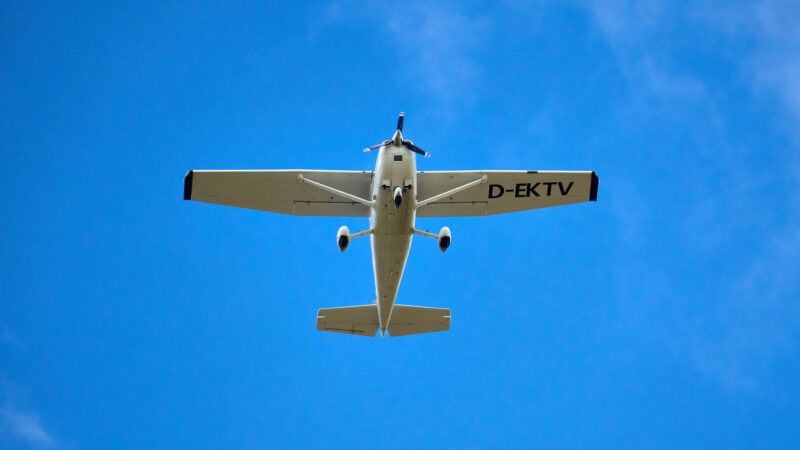So You Wanted Flying Cars?
Plus: Chinese state-sponsored hackers, Trump-Epstein bromance, and more...

Here they come: The Federal Aviation Administration just lifted regulations on light-sport aircraft. "Our recreational pilots and plane manufacturers have correctly noted outdated regulations were inhibiting innovation and safety," said Transportation Secretary Sean Duffy in a statement. "No more. Let's bring this industry into a new age!"
The new Modernization of Special Airworthiness Certification (MOSAIC) rule makes huge changes to how light-sport aircraft are regulated: It majorly ups weight and speed limits; includes aircraft with retractable landing gear and more seats; allows "for new types of propulsion and modern avionics" (including provisions to deal with simplified flight controls); and lets "pilots operating under Sport Pilot privileges to fly a broader range of aircraft." This is actually a really good thing for people who care about innovation!
The Reason Roundup Newsletter by Liz Wolfe Liz and Reason help you make sense of the day's news every morning.
"The safety continuum makes sense," writes Eli Dourado on his Substack newsletter. "US airlines carry hundreds of millions of paying passengers per year. Those passengers have high safety expectations, particularly because some of them feel out of control on an airliner in a way that they don't in a car they're driving or riding in. The airline business doesn't work without a high safety bar.…At the other end of the safety continuum, there are some pretty big benefits to allowing experimentation. The system of permissionless innovation under which the Wright brothers worked is directly responsible for us having aviation at all. We made rapid progress in the early days of aviation by sacrificing a lot of test pilots. Even today, new aviation technology often starts out in the experimental and light-sport world and works its way up to airliners over time as safety regulators figure out how to certify it as safe. Composite materials are one example—they were used in experimental aircraft for decades before the 787 became the first majority-composite airliner."
Dourado also notes that the loosening of these rules allows new entrants in the field to hire talent and start companies. "Let's say you were starting a company to build airliners," he adds. "You could have trouble finding engineers with Part 25 experience—you might have to hire them away from Boeing or Airbus. But fortunately, it's relatively easy to find engineers who have built experimental or Part 23 aircraft before." Basically, there are huge benefits to having a bias toward allowing innovation and experimentation, and there are actually huge safety costs to overregulating this industry, since innovation will be crippled and we'll lose out on unseen, unknowable advancements.
The upshot, per Dourado: "By making a category of aircraft that doesn't require type certification, is actually useful for transportation (250 knots and 4 seats), and can be flown with less skill via simplified flight controls, FAA is opening the door to a bigger market and vastly more innovation."
It's not exactly the Trump administration legalized flying cars, but it is a step closer to that. If you want innovation in this realm, this is how you get it.
Scenes from New York: "Columbia University has expelled and suspended students who were involved in a pro-Palestinian demonstration that shut down the main campus library in May, moving more quickly to hand down punishments than it has in the past, university officials announced on Tuesday," reports The New York Times.
Universities being tougher on really bad conduct—the type that impedes other students' abilities to learn and use public spaces; the type that damages university property—is probably a great way to attempt to get in front of the Trump administration's attempted crackdown. Though the threats to pull federal funding make my libertarian heart sing, the administration is at times demanding or implying that the universities crack down on certain types of protected First Amendment activity, which is decidedly not the way. It's true that Columbia's leaders should not have allowed the takeover and occupation of Hamilton Hall, but it's also not clear to me that the feds needed to get involved; the better course of action is the one Columbia is taking now (albeit a year too late).
QUICK HITS
- "Photos from 1993 confirm for the first time that Epstein attended Trump's 1993 wedding to Marla Maples. Epstein's attendance at the ceremony at the Plaza Hotel was not widely known until now," reports CNN. "In addition, footage from a 1999 Victoria's Secret fashion event in New York shows Trump and Epstein laughing and chatting together ahead of the runway event." Trump's response:
In a brief call with CNN on Tuesday, President Trump, asked about the wedding photos, responded, "You've got to be kidding me," before repeatedly calling CNN "fake news" and hanging up. https://t.co/uLY9i0pz93
— Edward-Isaac Dovere (@IsaacDovere) July 22, 2025
Honestly, we already knew they were friends, so this doesn't really do much to answer the outstanding question: How much did Trump know about Epstein's sexual crimes, and what efforts have powerful people inside and outside the government taken to cover them up?
- Ozzy Osbourne dies at 76. RIP.
- Yes:
Usually when I see someone saying something awful is capitalism they are describing something that 1) is genuinely awful 2) is a consequence of material scarcity and 3) has gotten much much less bad under capitalism
— Kelsey Piper (@KelseyTuoc) July 21, 2025
- "Microsoft Corp. warned that Chinese state-sponsored hackers are among those exploiting flaws in its SharePoint software to break into institutions globally, with the US agency responsible for designing nuclear weapons now among those breached," reports Bloomberg.


Show Comments (380)